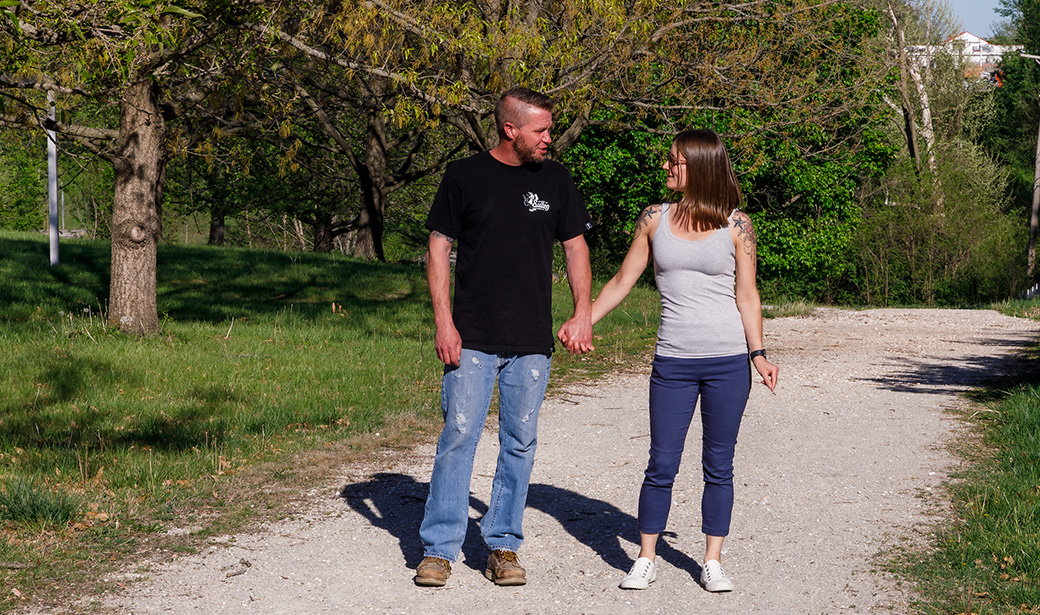Every morning for more than 30 years, Tucker Leonard would wake up prepared for his own hands to fight him.
Intensely sweaty palms made most tasks harder for him than the average 8-year-old, which was when Leonard first noticed his condition. He remembers the sound his dad’s hands made when rubbed together but being unable to make that sound himself.
“It started being a factor playing Nintendo with other kids, sharing controllers,” Leonard said. “My turn ended playing Double Dragon or Super Mario Bros. and the person after would go, ‘This thing’s wet.’ ... I dealt with this long enough that if I had to give up a piece of my left ear to fix it, I probably would’ve. It’s a miserable thing to live with.”
Human beings sweat for two reasons: To regulate our body temperature, and in response to emotions such as fear or nervousness. Leonard, and about 2-3% of Americans, have a condition called focal hyperhidrosis in which their body’s impulse to create sweat on the hands is increased and not controlled normally.
Some people develop hyperhidrosis because of an injury or another medical condition. People with focal hyperhidrosis are born with the condition, which doctors suspect is genetic.
Although it’s not life-threatening, palmar hyperhidrosis has strong emotional effects, causing stress and anxiety with every touch.
It had a big role in Leonard’s career path. He knew his sweat would make office work difficult, so Leonard worked construction and trade jobs like his dad. That wasn’t easy, either: The extreme moisture on his hands meant they were always cold in the winter, even while wearing thick work gloves.
“I worked on turbine engines, and you wear rubber gloves for protection,” Leonard said. “I would have water running down my arms out of these gloves, and water went everywhere when I’d take them off. And then to put another pair on, or to wear cotton glove liners in my work gloves, it would take me three minutes to put a pair of gloves on and that’s just not my speed.”
Leonard tried every topical solution and cream and went to several dermatologists looking for relief. He couldn’t take medication for palmar hyperhidrosis because of the risk of dehydration on the job site, so he tried Botox injections, 70 in each hand, to paralyze the nerves.
It was painful and the results didn’t last. As someone who sells and installs vinyl signs, Leonard needed full function in his hands — and clean, dry hands — to work well.
Then in January of 2024, Leonard’s dermatologist referred him to Sebastian Wiesemann, MD, a thoracic surgeon formerly at MU Health Care, who specializes in minimally invasive surgeries in the chest.
“Patients like Tucker come to us because their condition is severe and conservative treatment has failed,” Wiesemann said. “Talking to him about his daily life, it was clear he had tried everything other than surgery.”
Wiesemann offered Leonard a minimally invasive procedure called endoscopic thoracic sympathectomy (ETS), which cuts the nerves running to each hand that cause sweating.
“Kids can usually compensate, but it gets more and more problematic in professional and social life,” Wiesemann said. “Routine actions for most of us become sources of embarrassment because your hands are so wet. The condition isn’t painful, but it's painful for the soul and it's painful for the patients on a psychological basis. They really suffer a lot.”
Minimally invasive means surgeons like Wiesemann don’t have to cut through the breastbone or spread apart the ribs to access the problem-causing nerves. By going into the chest cavity with tiny endoscopic tubes and a camera, Wiesemann navigates to a very specific place on the nerve to make his cut.
Through studies, doctors discovered that cutting too low — below the fourth rib — wouldn’t completely relieve sweating in the hands and armpits. But cutting too high — above the third rib — could lead to something called excessive compensatory sweating, in which the sweat moved to a different part of the body.
“We cut very selectively,” Wiesemann said. “The location we cut is like cutting the telephone line that was sending the call to the hands and making them sweat, but it does not affect the rest of the autonomous nervous system. Cutting at the level of the third rib is the sweet spot where the hands are dry enough, but the amount of compensatory sweating is not as severe.”
Wiesemann and Leonard talked about these risks and other potential risks from the surgery itself, which are rare but possible. Leonard had been dealing with the condition for more than 30 years and wanted to try. His main worry was that ETS wouldn’t be covered by insurance, but Wiesemann and the surgical support staff helped make sure it was.
Another factor was Leonard’s job changing. He got a promotion, which meant more office work, and he wanted a more permanent solution, rather than using a rag and constantly washing his hands. Leonard wanted to feel comfortable shaking someone’s hand to close a deal and carry a piece of paper across the office without worrying about it soaking through.
After decades of trying to find an answer, Leonard’s surgery took 20 minutes, with two tiny cuts per side. After waking up, he immediately noticed the change. All he wanted to do was hold his wife’s hand. As she drove them home, he sat in the passenger seat rubbing his hands together and listening to the noise it made.
“Personally and professionally it’s tenfold better,” Leonard said. “It’s so much better to be able to hold hands or even touch my wife’s face romantically. I think it saved my new position at work too, because you have to be focused learning a new position and I’m sidetracked by how I’m going to hide this. Huge difference.”
Because palmar hyperhidrosis is a genetic condition, there is a 30-60% chance it will be inherited. The Leonards have two kids who are almost in high school, and Tucker knows he passed it on to both. He and Wiesemann have had talks about when his kids will be old enough to make their own decision.
“That comfort I have with Dr. Wiesemann is a big deal,” Leonard said. “I felt safe, and after talking to him I had zero worries about myself or my kids having this surgery done by him.”




